Report: Sackler Family and Opioid Crisis Impact on Museum Donations
VerifiedAdded on 2023/01/18
|10
|2578
|87
Report
AI Summary
This report provides an executive summary and detailed analysis of the Sackler Family's involvement in the Opioid Crisis, specifically focusing on their donations to museums and galleries. The study examines the ethical implications of these donations, the public's perception, and the success of recipient organizations. It explores the impact of the crisis on the reputation of museums, the services they offer, and the effectiveness of regulations concerning donations. The report presents a conclusion based on the research and offers recommendations for museums and galleries regarding ethical philanthropy and the acceptance of donations from controversial sources. The report highlights the moral and ethical considerations surrounding the Sackler Family's actions and their impact on various institutions.
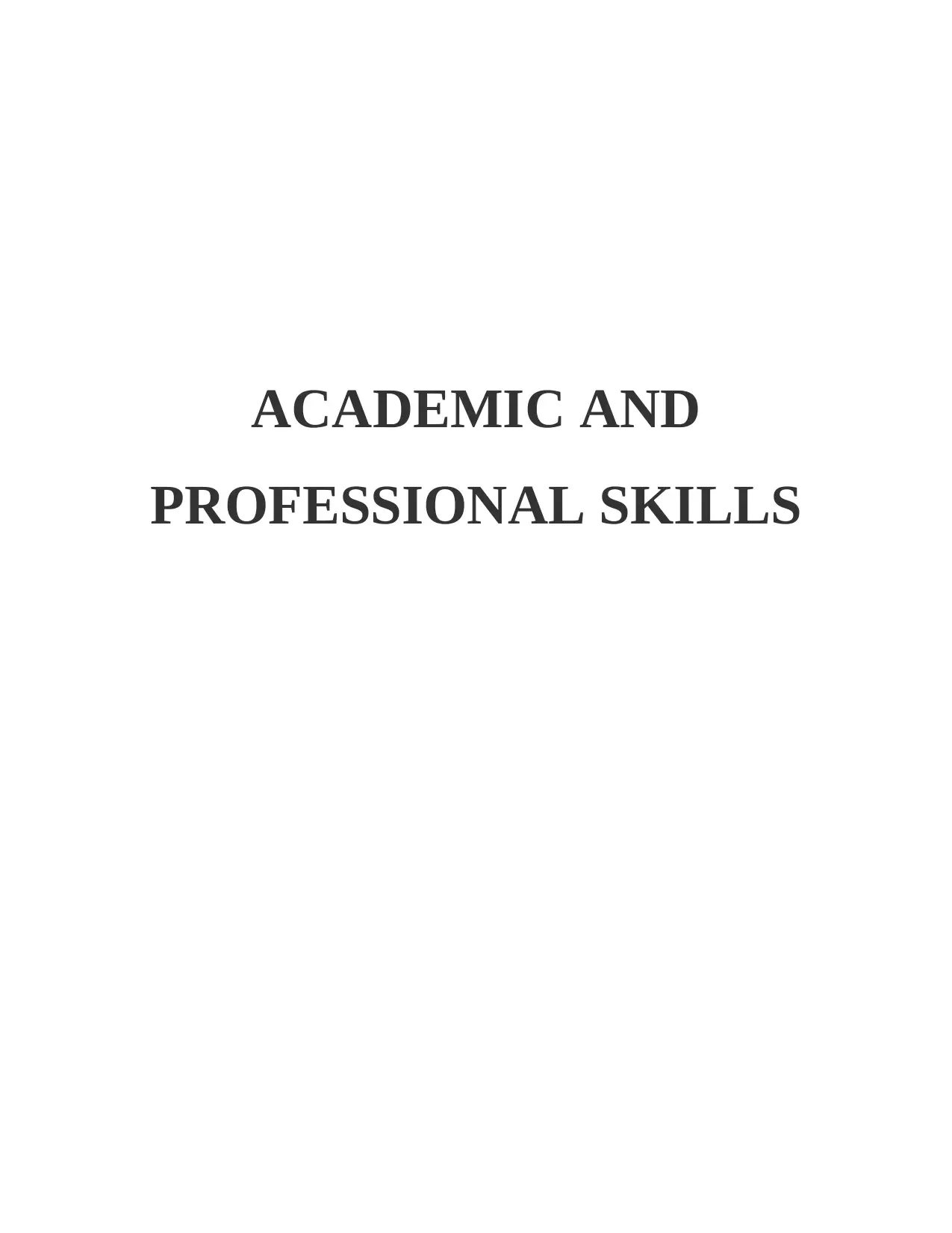
ACADEMIC AND
PROFESSIONAL SKILLS
PROFESSIONAL SKILLS
Paraphrase This Document
Need a fresh take? Get an instant paraphrase of this document with our AI Paraphraser
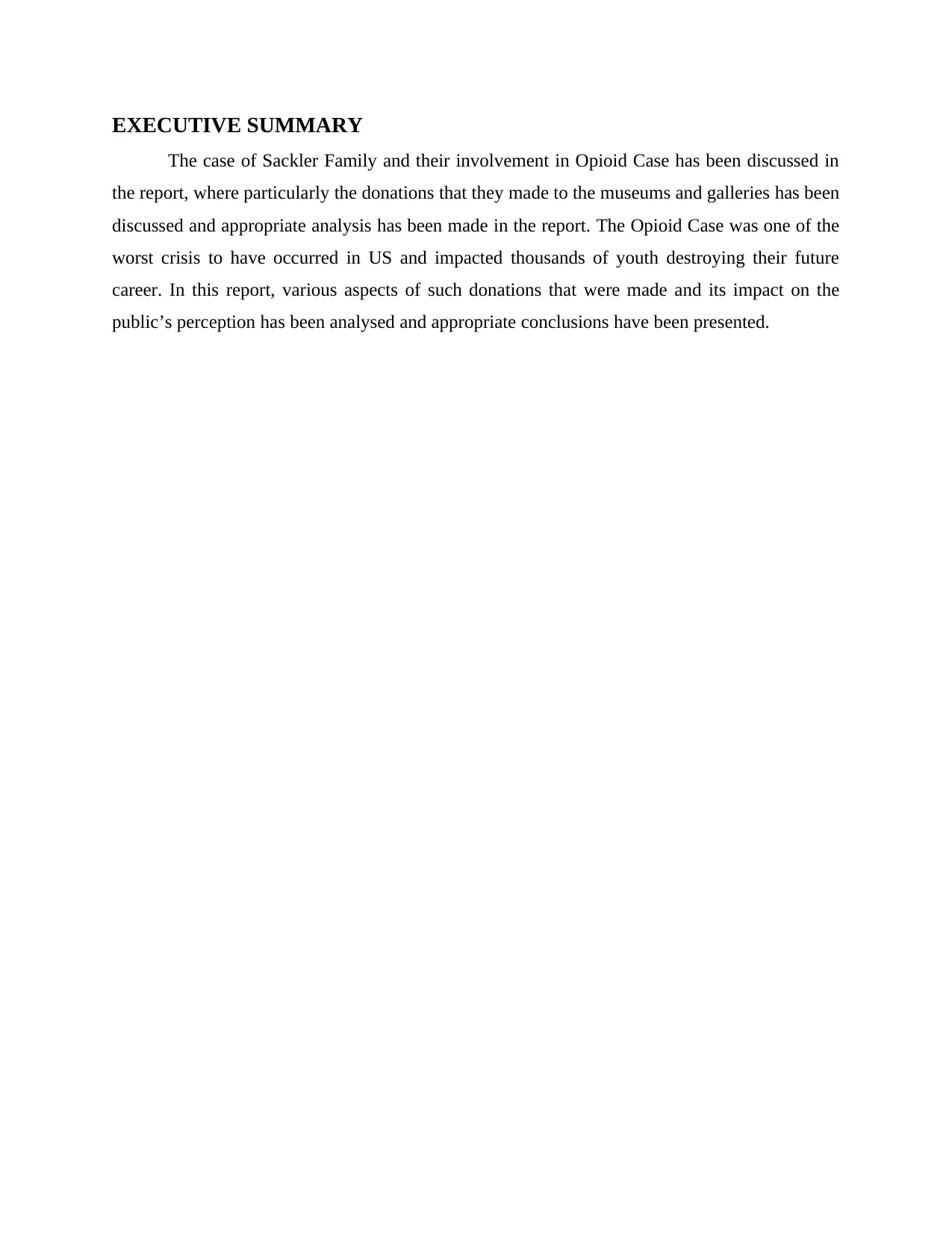
EXECUTIVE SUMMARY
The case of Sackler Family and their involvement in Opioid Case has been discussed in
the report, where particularly the donations that they made to the museums and galleries has been
discussed and appropriate analysis has been made in the report. The Opioid Case was one of the
worst crisis to have occurred in US and impacted thousands of youth destroying their future
career. In this report, various aspects of such donations that were made and its impact on the
public’s perception has been analysed and appropriate conclusions have been presented.
The case of Sackler Family and their involvement in Opioid Case has been discussed in
the report, where particularly the donations that they made to the museums and galleries has been
discussed and appropriate analysis has been made in the report. The Opioid Case was one of the
worst crisis to have occurred in US and impacted thousands of youth destroying their future
career. In this report, various aspects of such donations that were made and its impact on the
public’s perception has been analysed and appropriate conclusions have been presented.
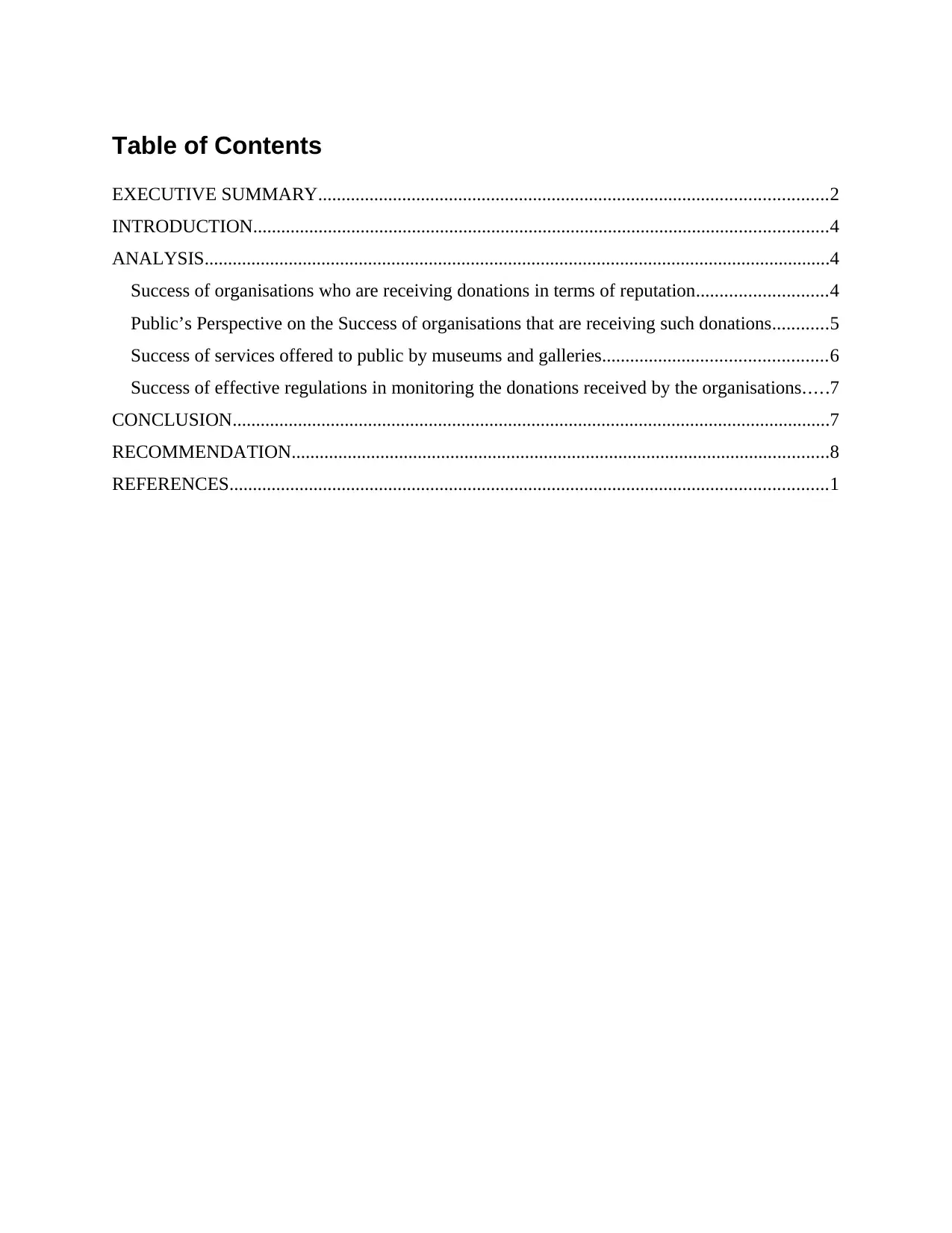
Table of Contents
EXECUTIVE SUMMARY.............................................................................................................2
INTRODUCTION...........................................................................................................................4
ANALYSIS......................................................................................................................................4
Success of organisations who are receiving donations in terms of reputation............................4
Public’s Perspective on the Success of organisations that are receiving such donations............5
Success of services offered to public by museums and galleries................................................6
Success of effective regulations in monitoring the donations received by the organisations.....7
CONCLUSION................................................................................................................................7
RECOMMENDATION...................................................................................................................8
REFERENCES................................................................................................................................1
EXECUTIVE SUMMARY.............................................................................................................2
INTRODUCTION...........................................................................................................................4
ANALYSIS......................................................................................................................................4
Success of organisations who are receiving donations in terms of reputation............................4
Public’s Perspective on the Success of organisations that are receiving such donations............5
Success of services offered to public by museums and galleries................................................6
Success of effective regulations in monitoring the donations received by the organisations.....7
CONCLUSION................................................................................................................................7
RECOMMENDATION...................................................................................................................8
REFERENCES................................................................................................................................1
⊘ This is a preview!⊘
Do you want full access?
Subscribe today to unlock all pages.

Trusted by 1+ million students worldwide
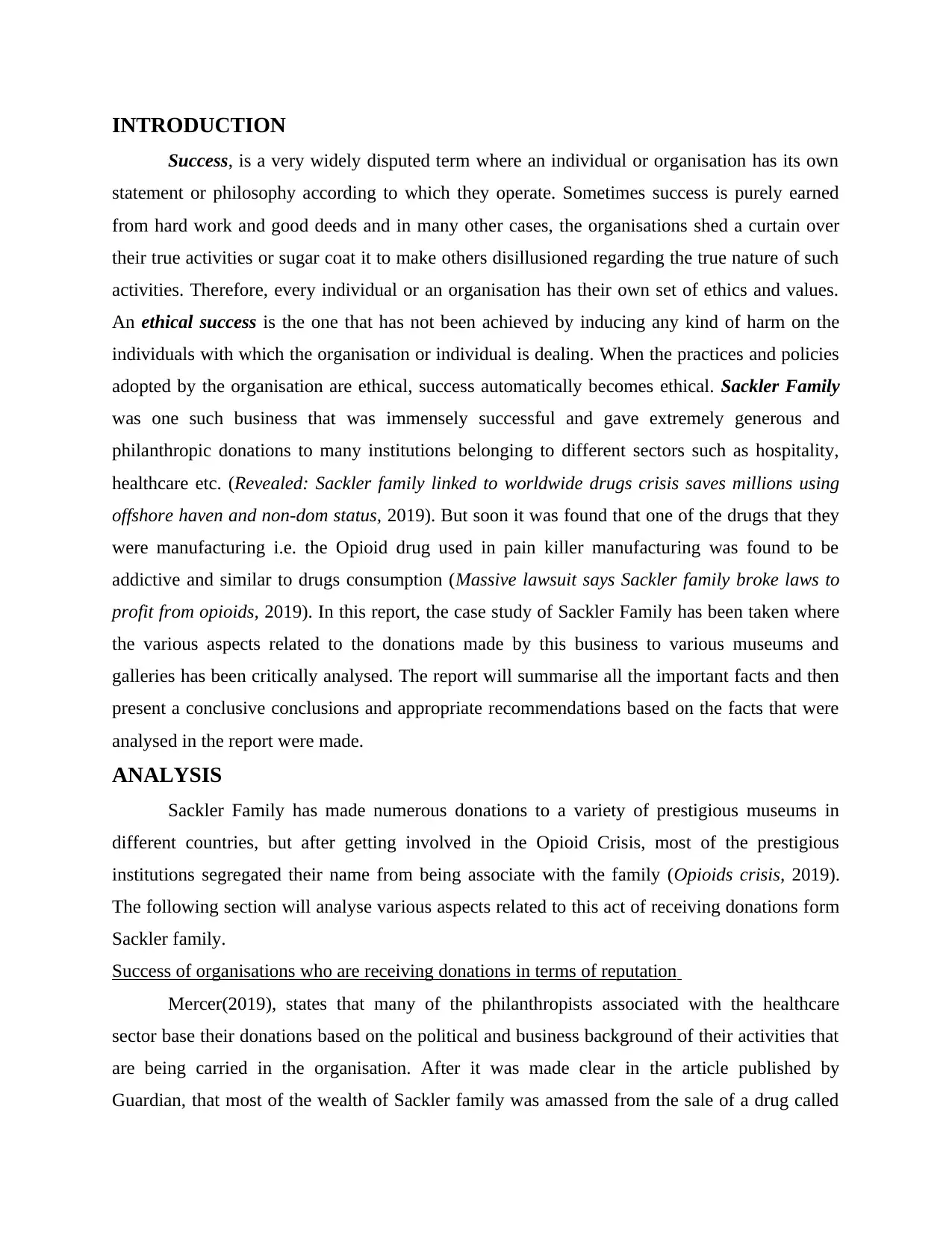
INTRODUCTION
Success, is a very widely disputed term where an individual or organisation has its own
statement or philosophy according to which they operate. Sometimes success is purely earned
from hard work and good deeds and in many other cases, the organisations shed a curtain over
their true activities or sugar coat it to make others disillusioned regarding the true nature of such
activities. Therefore, every individual or an organisation has their own set of ethics and values.
An ethical success is the one that has not been achieved by inducing any kind of harm on the
individuals with which the organisation or individual is dealing. When the practices and policies
adopted by the organisation are ethical, success automatically becomes ethical. Sackler Family
was one such business that was immensely successful and gave extremely generous and
philanthropic donations to many institutions belonging to different sectors such as hospitality,
healthcare etc. (Revealed: Sackler family linked to worldwide drugs crisis saves millions using
offshore haven and non-dom status, 2019). But soon it was found that one of the drugs that they
were manufacturing i.e. the Opioid drug used in pain killer manufacturing was found to be
addictive and similar to drugs consumption (Massive lawsuit says Sackler family broke laws to
profit from opioids, 2019). In this report, the case study of Sackler Family has been taken where
the various aspects related to the donations made by this business to various museums and
galleries has been critically analysed. The report will summarise all the important facts and then
present a conclusive conclusions and appropriate recommendations based on the facts that were
analysed in the report were made.
ANALYSIS
Sackler Family has made numerous donations to a variety of prestigious museums in
different countries, but after getting involved in the Opioid Crisis, most of the prestigious
institutions segregated their name from being associate with the family (Opioids crisis, 2019).
The following section will analyse various aspects related to this act of receiving donations form
Sackler family.
Success of organisations who are receiving donations in terms of reputation
Mercer(2019), states that many of the philanthropists associated with the healthcare
sector base their donations based on the political and business background of their activities that
are being carried in the organisation. After it was made clear in the article published by
Guardian, that most of the wealth of Sackler family was amassed from the sale of a drug called
Success, is a very widely disputed term where an individual or organisation has its own
statement or philosophy according to which they operate. Sometimes success is purely earned
from hard work and good deeds and in many other cases, the organisations shed a curtain over
their true activities or sugar coat it to make others disillusioned regarding the true nature of such
activities. Therefore, every individual or an organisation has their own set of ethics and values.
An ethical success is the one that has not been achieved by inducing any kind of harm on the
individuals with which the organisation or individual is dealing. When the practices and policies
adopted by the organisation are ethical, success automatically becomes ethical. Sackler Family
was one such business that was immensely successful and gave extremely generous and
philanthropic donations to many institutions belonging to different sectors such as hospitality,
healthcare etc. (Revealed: Sackler family linked to worldwide drugs crisis saves millions using
offshore haven and non-dom status, 2019). But soon it was found that one of the drugs that they
were manufacturing i.e. the Opioid drug used in pain killer manufacturing was found to be
addictive and similar to drugs consumption (Massive lawsuit says Sackler family broke laws to
profit from opioids, 2019). In this report, the case study of Sackler Family has been taken where
the various aspects related to the donations made by this business to various museums and
galleries has been critically analysed. The report will summarise all the important facts and then
present a conclusive conclusions and appropriate recommendations based on the facts that were
analysed in the report were made.
ANALYSIS
Sackler Family has made numerous donations to a variety of prestigious museums in
different countries, but after getting involved in the Opioid Crisis, most of the prestigious
institutions segregated their name from being associate with the family (Opioids crisis, 2019).
The following section will analyse various aspects related to this act of receiving donations form
Sackler family.
Success of organisations who are receiving donations in terms of reputation
Mercer(2019), states that many of the philanthropists associated with the healthcare
sector base their donations based on the political and business background of their activities that
are being carried in the organisation. After it was made clear in the article published by
Guardian, that most of the wealth of Sackler family was amassed from the sale of a drug called
Paraphrase This Document
Need a fresh take? Get an instant paraphrase of this document with our AI Paraphraser
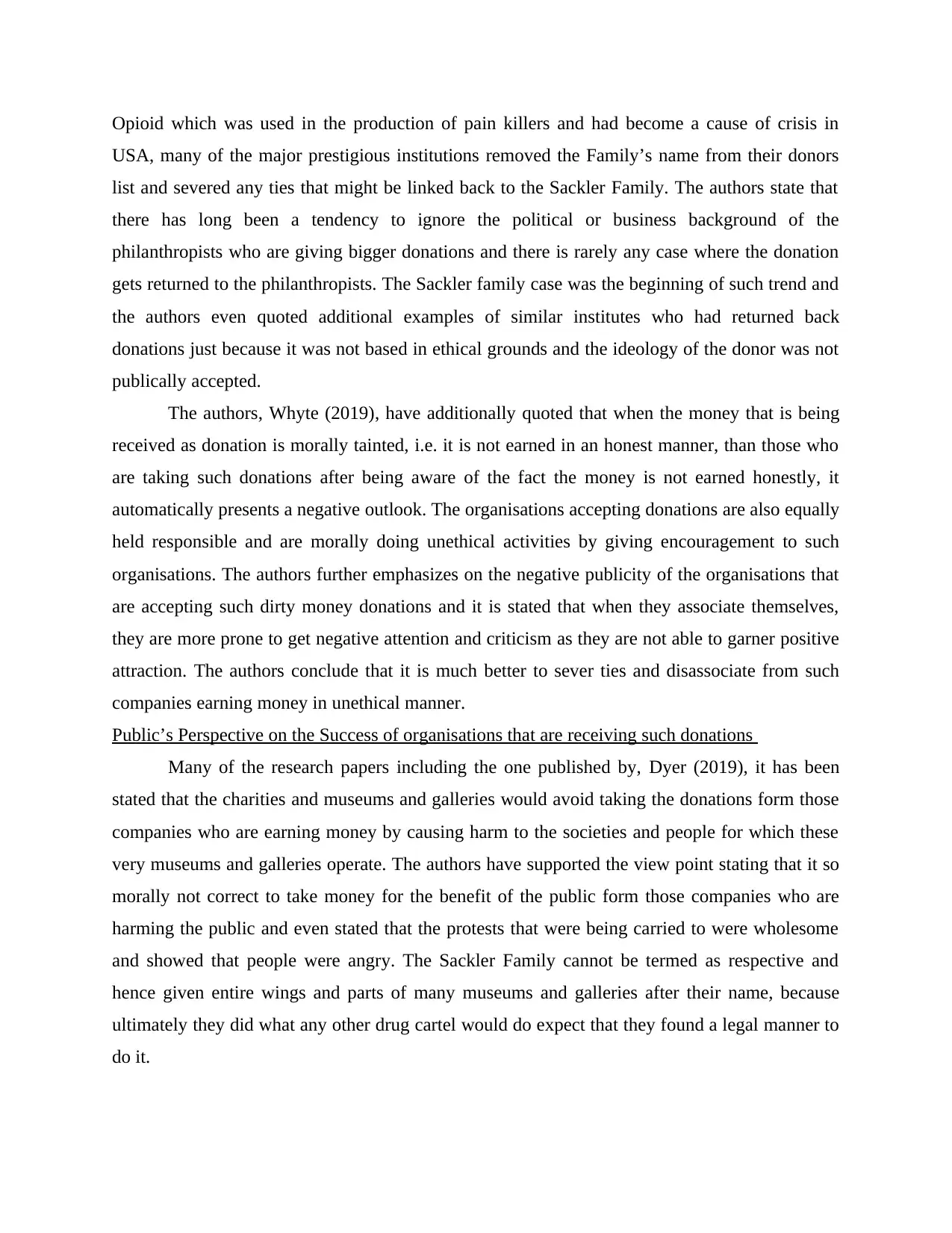
Opioid which was used in the production of pain killers and had become a cause of crisis in
USA, many of the major prestigious institutions removed the Family’s name from their donors
list and severed any ties that might be linked back to the Sackler Family. The authors state that
there has long been a tendency to ignore the political or business background of the
philanthropists who are giving bigger donations and there is rarely any case where the donation
gets returned to the philanthropists. The Sackler family case was the beginning of such trend and
the authors even quoted additional examples of similar institutes who had returned back
donations just because it was not based in ethical grounds and the ideology of the donor was not
publically accepted.
The authors, Whyte (2019), have additionally quoted that when the money that is being
received as donation is morally tainted, i.e. it is not earned in an honest manner, than those who
are taking such donations after being aware of the fact the money is not earned honestly, it
automatically presents a negative outlook. The organisations accepting donations are also equally
held responsible and are morally doing unethical activities by giving encouragement to such
organisations. The authors further emphasizes on the negative publicity of the organisations that
are accepting such dirty money donations and it is stated that when they associate themselves,
they are more prone to get negative attention and criticism as they are not able to garner positive
attraction. The authors conclude that it is much better to sever ties and disassociate from such
companies earning money in unethical manner.
Public’s Perspective on the Success of organisations that are receiving such donations
Many of the research papers including the one published by, Dyer (2019), it has been
stated that the charities and museums and galleries would avoid taking the donations form those
companies who are earning money by causing harm to the societies and people for which these
very museums and galleries operate. The authors have supported the view point stating that it so
morally not correct to take money for the benefit of the public form those companies who are
harming the public and even stated that the protests that were being carried to were wholesome
and showed that people were angry. The Sackler Family cannot be termed as respective and
hence given entire wings and parts of many museums and galleries after their name, because
ultimately they did what any other drug cartel would do expect that they found a legal manner to
do it.
USA, many of the major prestigious institutions removed the Family’s name from their donors
list and severed any ties that might be linked back to the Sackler Family. The authors state that
there has long been a tendency to ignore the political or business background of the
philanthropists who are giving bigger donations and there is rarely any case where the donation
gets returned to the philanthropists. The Sackler family case was the beginning of such trend and
the authors even quoted additional examples of similar institutes who had returned back
donations just because it was not based in ethical grounds and the ideology of the donor was not
publically accepted.
The authors, Whyte (2019), have additionally quoted that when the money that is being
received as donation is morally tainted, i.e. it is not earned in an honest manner, than those who
are taking such donations after being aware of the fact the money is not earned honestly, it
automatically presents a negative outlook. The organisations accepting donations are also equally
held responsible and are morally doing unethical activities by giving encouragement to such
organisations. The authors further emphasizes on the negative publicity of the organisations that
are accepting such dirty money donations and it is stated that when they associate themselves,
they are more prone to get negative attention and criticism as they are not able to garner positive
attraction. The authors conclude that it is much better to sever ties and disassociate from such
companies earning money in unethical manner.
Public’s Perspective on the Success of organisations that are receiving such donations
Many of the research papers including the one published by, Dyer (2019), it has been
stated that the charities and museums and galleries would avoid taking the donations form those
companies who are earning money by causing harm to the societies and people for which these
very museums and galleries operate. The authors have supported the view point stating that it so
morally not correct to take money for the benefit of the public form those companies who are
harming the public and even stated that the protests that were being carried to were wholesome
and showed that people were angry. The Sackler Family cannot be termed as respective and
hence given entire wings and parts of many museums and galleries after their name, because
ultimately they did what any other drug cartel would do expect that they found a legal manner to
do it.
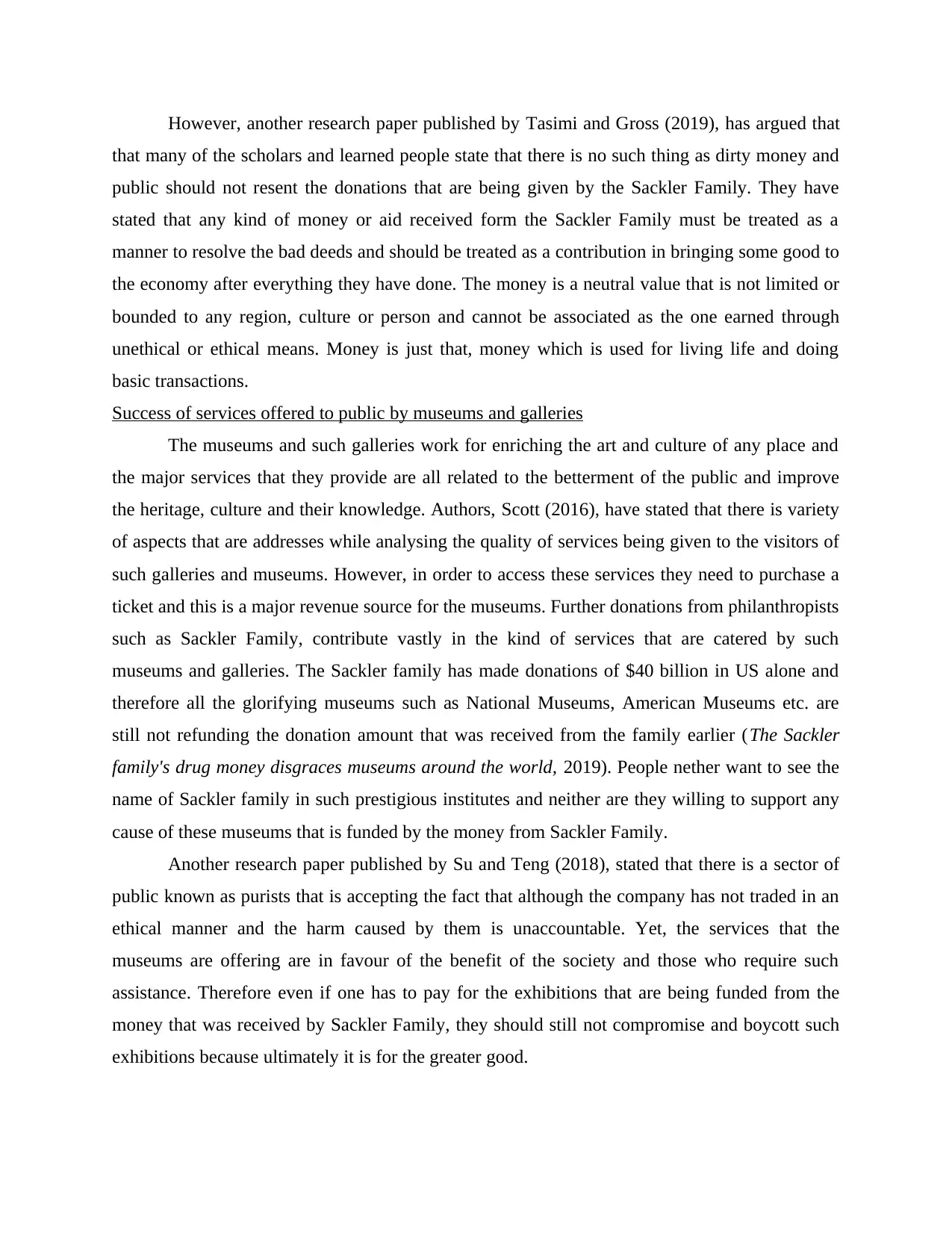
However, another research paper published by Tasimi and Gross (2019), has argued that
that many of the scholars and learned people state that there is no such thing as dirty money and
public should not resent the donations that are being given by the Sackler Family. They have
stated that any kind of money or aid received form the Sackler Family must be treated as a
manner to resolve the bad deeds and should be treated as a contribution in bringing some good to
the economy after everything they have done. The money is a neutral value that is not limited or
bounded to any region, culture or person and cannot be associated as the one earned through
unethical or ethical means. Money is just that, money which is used for living life and doing
basic transactions.
Success of services offered to public by museums and galleries
The museums and such galleries work for enriching the art and culture of any place and
the major services that they provide are all related to the betterment of the public and improve
the heritage, culture and their knowledge. Authors, Scott (2016), have stated that there is variety
of aspects that are addresses while analysing the quality of services being given to the visitors of
such galleries and museums. However, in order to access these services they need to purchase a
ticket and this is a major revenue source for the museums. Further donations from philanthropists
such as Sackler Family, contribute vastly in the kind of services that are catered by such
museums and galleries. The Sackler family has made donations of $40 billion in US alone and
therefore all the glorifying museums such as National Museums, American Museums etc. are
still not refunding the donation amount that was received from the family earlier (The Sackler
family's drug money disgraces museums around the world, 2019). People nether want to see the
name of Sackler family in such prestigious institutes and neither are they willing to support any
cause of these museums that is funded by the money from Sackler Family.
Another research paper published by Su and Teng (2018), stated that there is a sector of
public known as purists that is accepting the fact that although the company has not traded in an
ethical manner and the harm caused by them is unaccountable. Yet, the services that the
museums are offering are in favour of the benefit of the society and those who require such
assistance. Therefore even if one has to pay for the exhibitions that are being funded from the
money that was received by Sackler Family, they should still not compromise and boycott such
exhibitions because ultimately it is for the greater good.
that many of the scholars and learned people state that there is no such thing as dirty money and
public should not resent the donations that are being given by the Sackler Family. They have
stated that any kind of money or aid received form the Sackler Family must be treated as a
manner to resolve the bad deeds and should be treated as a contribution in bringing some good to
the economy after everything they have done. The money is a neutral value that is not limited or
bounded to any region, culture or person and cannot be associated as the one earned through
unethical or ethical means. Money is just that, money which is used for living life and doing
basic transactions.
Success of services offered to public by museums and galleries
The museums and such galleries work for enriching the art and culture of any place and
the major services that they provide are all related to the betterment of the public and improve
the heritage, culture and their knowledge. Authors, Scott (2016), have stated that there is variety
of aspects that are addresses while analysing the quality of services being given to the visitors of
such galleries and museums. However, in order to access these services they need to purchase a
ticket and this is a major revenue source for the museums. Further donations from philanthropists
such as Sackler Family, contribute vastly in the kind of services that are catered by such
museums and galleries. The Sackler family has made donations of $40 billion in US alone and
therefore all the glorifying museums such as National Museums, American Museums etc. are
still not refunding the donation amount that was received from the family earlier (The Sackler
family's drug money disgraces museums around the world, 2019). People nether want to see the
name of Sackler family in such prestigious institutes and neither are they willing to support any
cause of these museums that is funded by the money from Sackler Family.
Another research paper published by Su and Teng (2018), stated that there is a sector of
public known as purists that is accepting the fact that although the company has not traded in an
ethical manner and the harm caused by them is unaccountable. Yet, the services that the
museums are offering are in favour of the benefit of the society and those who require such
assistance. Therefore even if one has to pay for the exhibitions that are being funded from the
money that was received by Sackler Family, they should still not compromise and boycott such
exhibitions because ultimately it is for the greater good.
⊘ This is a preview!⊘
Do you want full access?
Subscribe today to unlock all pages.

Trusted by 1+ million students worldwide
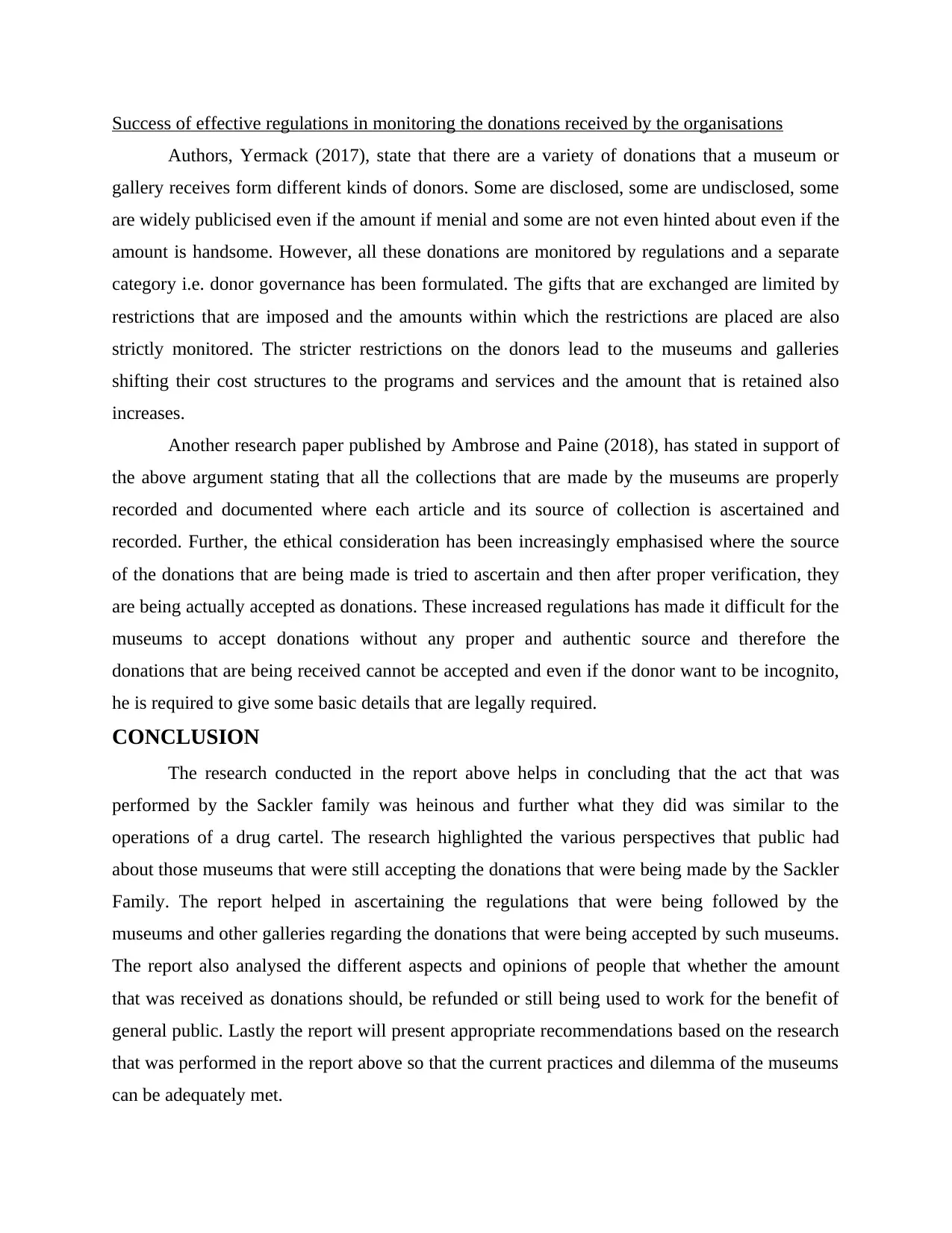
Success of effective regulations in monitoring the donations received by the organisations
Authors, Yermack (2017), state that there are a variety of donations that a museum or
gallery receives form different kinds of donors. Some are disclosed, some are undisclosed, some
are widely publicised even if the amount if menial and some are not even hinted about even if the
amount is handsome. However, all these donations are monitored by regulations and a separate
category i.e. donor governance has been formulated. The gifts that are exchanged are limited by
restrictions that are imposed and the amounts within which the restrictions are placed are also
strictly monitored. The stricter restrictions on the donors lead to the museums and galleries
shifting their cost structures to the programs and services and the amount that is retained also
increases.
Another research paper published by Ambrose and Paine (2018), has stated in support of
the above argument stating that all the collections that are made by the museums are properly
recorded and documented where each article and its source of collection is ascertained and
recorded. Further, the ethical consideration has been increasingly emphasised where the source
of the donations that are being made is tried to ascertain and then after proper verification, they
are being actually accepted as donations. These increased regulations has made it difficult for the
museums to accept donations without any proper and authentic source and therefore the
donations that are being received cannot be accepted and even if the donor want to be incognito,
he is required to give some basic details that are legally required.
CONCLUSION
The research conducted in the report above helps in concluding that the act that was
performed by the Sackler family was heinous and further what they did was similar to the
operations of a drug cartel. The research highlighted the various perspectives that public had
about those museums that were still accepting the donations that were being made by the Sackler
Family. The report helped in ascertaining the regulations that were being followed by the
museums and other galleries regarding the donations that were being accepted by such museums.
The report also analysed the different aspects and opinions of people that whether the amount
that was received as donations should, be refunded or still being used to work for the benefit of
general public. Lastly the report will present appropriate recommendations based on the research
that was performed in the report above so that the current practices and dilemma of the museums
can be adequately met.
Authors, Yermack (2017), state that there are a variety of donations that a museum or
gallery receives form different kinds of donors. Some are disclosed, some are undisclosed, some
are widely publicised even if the amount if menial and some are not even hinted about even if the
amount is handsome. However, all these donations are monitored by regulations and a separate
category i.e. donor governance has been formulated. The gifts that are exchanged are limited by
restrictions that are imposed and the amounts within which the restrictions are placed are also
strictly monitored. The stricter restrictions on the donors lead to the museums and galleries
shifting their cost structures to the programs and services and the amount that is retained also
increases.
Another research paper published by Ambrose and Paine (2018), has stated in support of
the above argument stating that all the collections that are made by the museums are properly
recorded and documented where each article and its source of collection is ascertained and
recorded. Further, the ethical consideration has been increasingly emphasised where the source
of the donations that are being made is tried to ascertain and then after proper verification, they
are being actually accepted as donations. These increased regulations has made it difficult for the
museums to accept donations without any proper and authentic source and therefore the
donations that are being received cannot be accepted and even if the donor want to be incognito,
he is required to give some basic details that are legally required.
CONCLUSION
The research conducted in the report above helps in concluding that the act that was
performed by the Sackler family was heinous and further what they did was similar to the
operations of a drug cartel. The research highlighted the various perspectives that public had
about those museums that were still accepting the donations that were being made by the Sackler
Family. The report helped in ascertaining the regulations that were being followed by the
museums and other galleries regarding the donations that were being accepted by such museums.
The report also analysed the different aspects and opinions of people that whether the amount
that was received as donations should, be refunded or still being used to work for the benefit of
general public. Lastly the report will present appropriate recommendations based on the research
that was performed in the report above so that the current practices and dilemma of the museums
can be adequately met.
Paraphrase This Document
Need a fresh take? Get an instant paraphrase of this document with our AI Paraphraser
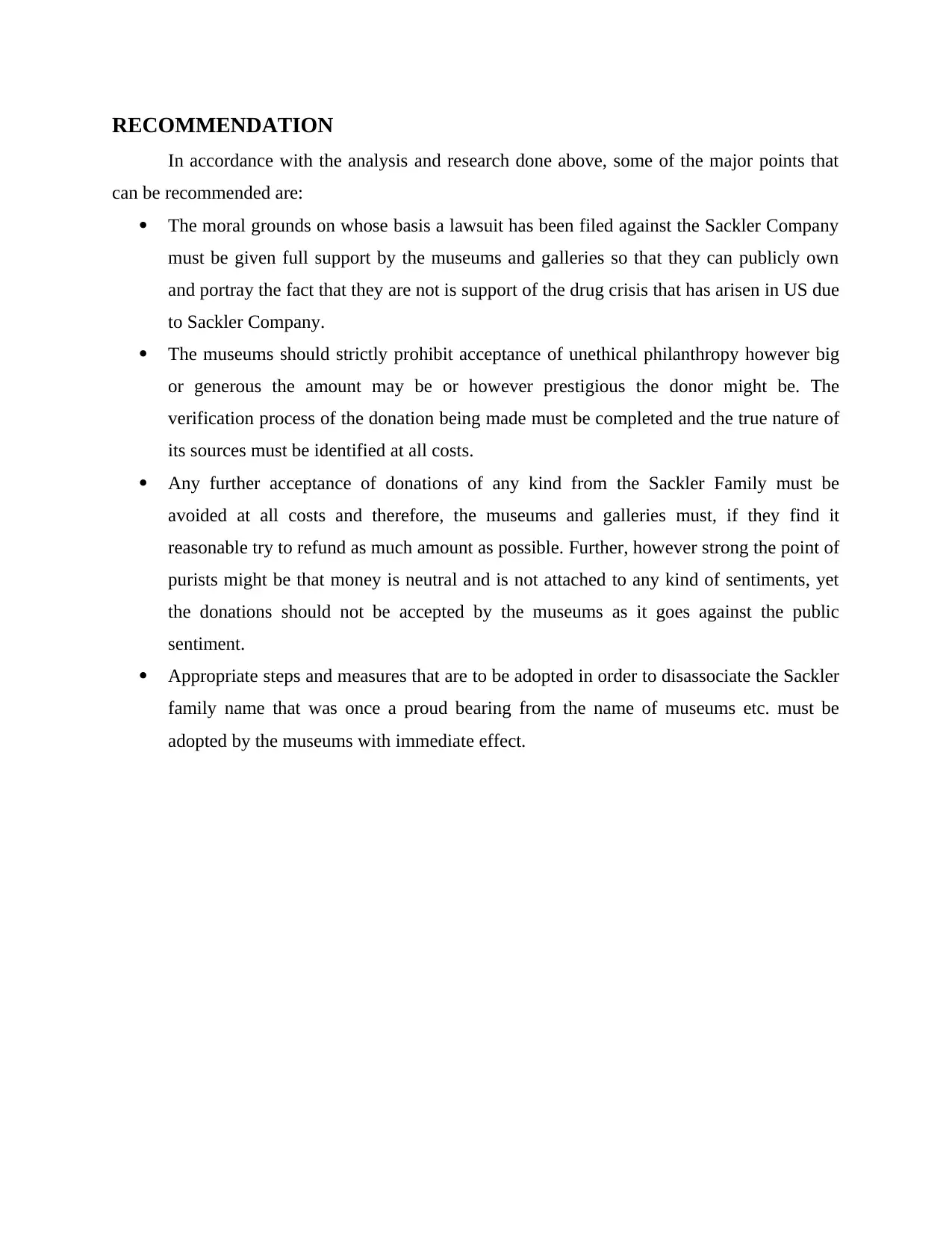
RECOMMENDATION
In accordance with the analysis and research done above, some of the major points that
can be recommended are:
The moral grounds on whose basis a lawsuit has been filed against the Sackler Company
must be given full support by the museums and galleries so that they can publicly own
and portray the fact that they are not is support of the drug crisis that has arisen in US due
to Sackler Company.
The museums should strictly prohibit acceptance of unethical philanthropy however big
or generous the amount may be or however prestigious the donor might be. The
verification process of the donation being made must be completed and the true nature of
its sources must be identified at all costs.
Any further acceptance of donations of any kind from the Sackler Family must be
avoided at all costs and therefore, the museums and galleries must, if they find it
reasonable try to refund as much amount as possible. Further, however strong the point of
purists might be that money is neutral and is not attached to any kind of sentiments, yet
the donations should not be accepted by the museums as it goes against the public
sentiment.
Appropriate steps and measures that are to be adopted in order to disassociate the Sackler
family name that was once a proud bearing from the name of museums etc. must be
adopted by the museums with immediate effect.
In accordance with the analysis and research done above, some of the major points that
can be recommended are:
The moral grounds on whose basis a lawsuit has been filed against the Sackler Company
must be given full support by the museums and galleries so that they can publicly own
and portray the fact that they are not is support of the drug crisis that has arisen in US due
to Sackler Company.
The museums should strictly prohibit acceptance of unethical philanthropy however big
or generous the amount may be or however prestigious the donor might be. The
verification process of the donation being made must be completed and the true nature of
its sources must be identified at all costs.
Any further acceptance of donations of any kind from the Sackler Family must be
avoided at all costs and therefore, the museums and galleries must, if they find it
reasonable try to refund as much amount as possible. Further, however strong the point of
purists might be that money is neutral and is not attached to any kind of sentiments, yet
the donations should not be accepted by the museums as it goes against the public
sentiment.
Appropriate steps and measures that are to be adopted in order to disassociate the Sackler
family name that was once a proud bearing from the name of museums etc. must be
adopted by the museums with immediate effect.
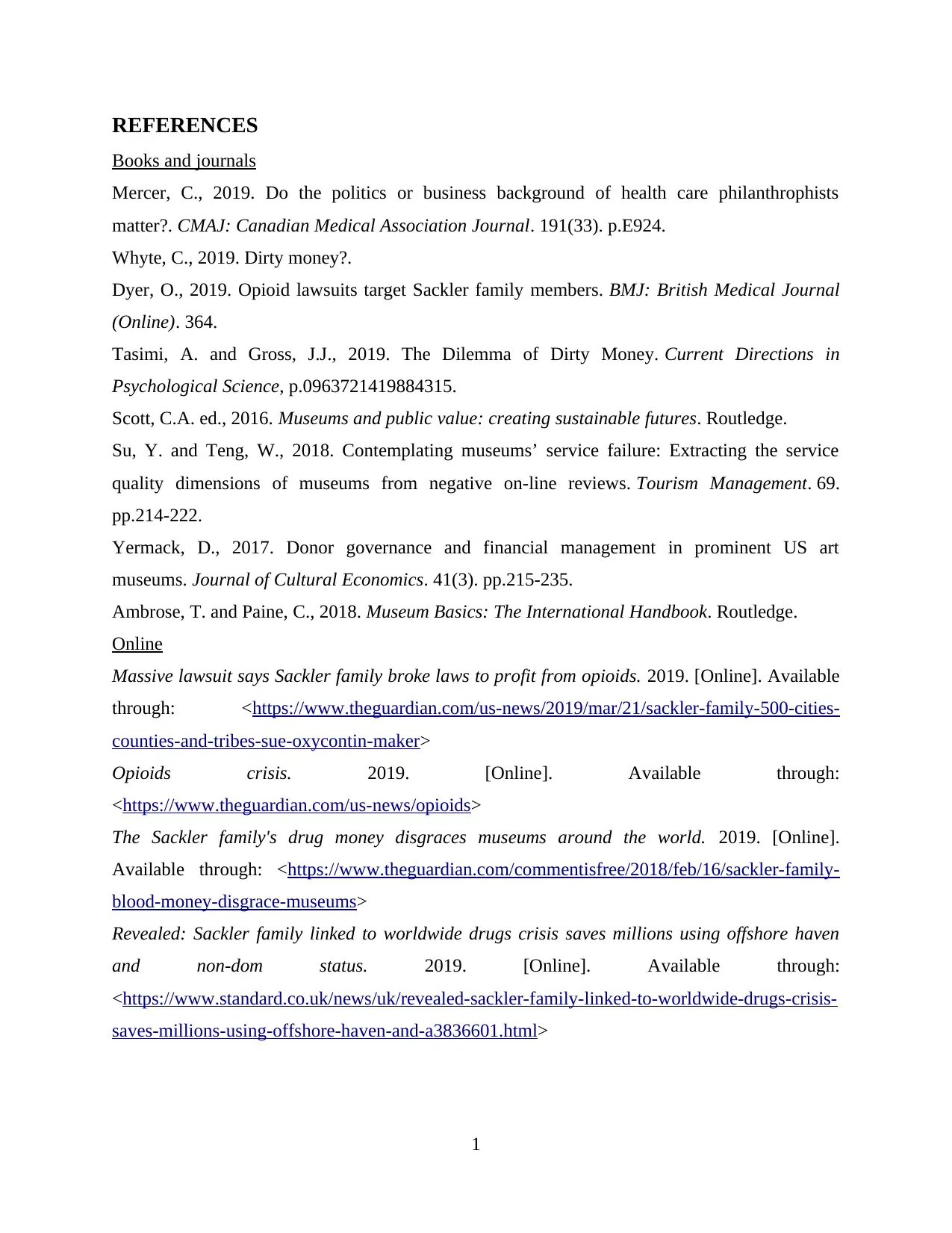
REFERENCES
Books and journals
Mercer, C., 2019. Do the politics or business background of health care philanthrophists
matter?. CMAJ: Canadian Medical Association Journal. 191(33). p.E924.
Whyte, C., 2019. Dirty money?.
Dyer, O., 2019. Opioid lawsuits target Sackler family members. BMJ: British Medical Journal
(Online). 364.
Tasimi, A. and Gross, J.J., 2019. The Dilemma of Dirty Money. Current Directions in
Psychological Science, p.0963721419884315.
Scott, C.A. ed., 2016. Museums and public value: creating sustainable futures. Routledge.
Su, Y. and Teng, W., 2018. Contemplating museums’ service failure: Extracting the service
quality dimensions of museums from negative on-line reviews. Tourism Management. 69.
pp.214-222.
Yermack, D., 2017. Donor governance and financial management in prominent US art
museums. Journal of Cultural Economics. 41(3). pp.215-235.
Ambrose, T. and Paine, C., 2018. Museum Basics: The International Handbook. Routledge.
Online
Massive lawsuit says Sackler family broke laws to profit from opioids. 2019. [Online]. Available
through: <https://www.theguardian.com/us-news/2019/mar/21/sackler-family-500-cities-
counties-and-tribes-sue-oxycontin-maker>
Opioids crisis. 2019. [Online]. Available through:
<https://www.theguardian.com/us-news/opioids>
The Sackler family's drug money disgraces museums around the world. 2019. [Online].
Available through: <https://www.theguardian.com/commentisfree/2018/feb/16/sackler-family-
blood-money-disgrace-museums>
Revealed: Sackler family linked to worldwide drugs crisis saves millions using offshore haven
and non-dom status. 2019. [Online]. Available through:
<https://www.standard.co.uk/news/uk/revealed-sackler-family-linked-to-worldwide-drugs-crisis-
saves-millions-using-offshore-haven-and-a3836601.html>
1
Books and journals
Mercer, C., 2019. Do the politics or business background of health care philanthrophists
matter?. CMAJ: Canadian Medical Association Journal. 191(33). p.E924.
Whyte, C., 2019. Dirty money?.
Dyer, O., 2019. Opioid lawsuits target Sackler family members. BMJ: British Medical Journal
(Online). 364.
Tasimi, A. and Gross, J.J., 2019. The Dilemma of Dirty Money. Current Directions in
Psychological Science, p.0963721419884315.
Scott, C.A. ed., 2016. Museums and public value: creating sustainable futures. Routledge.
Su, Y. and Teng, W., 2018. Contemplating museums’ service failure: Extracting the service
quality dimensions of museums from negative on-line reviews. Tourism Management. 69.
pp.214-222.
Yermack, D., 2017. Donor governance and financial management in prominent US art
museums. Journal of Cultural Economics. 41(3). pp.215-235.
Ambrose, T. and Paine, C., 2018. Museum Basics: The International Handbook. Routledge.
Online
Massive lawsuit says Sackler family broke laws to profit from opioids. 2019. [Online]. Available
through: <https://www.theguardian.com/us-news/2019/mar/21/sackler-family-500-cities-
counties-and-tribes-sue-oxycontin-maker>
Opioids crisis. 2019. [Online]. Available through:
<https://www.theguardian.com/us-news/opioids>
The Sackler family's drug money disgraces museums around the world. 2019. [Online].
Available through: <https://www.theguardian.com/commentisfree/2018/feb/16/sackler-family-
blood-money-disgrace-museums>
Revealed: Sackler family linked to worldwide drugs crisis saves millions using offshore haven
and non-dom status. 2019. [Online]. Available through:
<https://www.standard.co.uk/news/uk/revealed-sackler-family-linked-to-worldwide-drugs-crisis-
saves-millions-using-offshore-haven-and-a3836601.html>
1
⊘ This is a preview!⊘
Do you want full access?
Subscribe today to unlock all pages.

Trusted by 1+ million students worldwide

2
1 out of 10
Related Documents
Your All-in-One AI-Powered Toolkit for Academic Success.
+13062052269
info@desklib.com
Available 24*7 on WhatsApp / Email
![[object Object]](/_next/static/media/star-bottom.7253800d.svg)
Unlock your academic potential
Copyright © 2020–2026 A2Z Services. All Rights Reserved. Developed and managed by ZUCOL.





